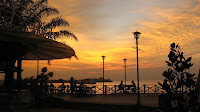So we left Vancouver and travelled halfway around the world to escape "Rain". But Rain's stronger, older brother, "Typhoon", somehow tracked us down and wanted to play with us in Shanghai.
Apparently this was one of the worst typhoons to hit the region in 50 years. To us, it seemed like just another rainy day in Vancouver.
During our post-typhoon afternoon tea break, we sit back and ponder our thoughts (as we often do): What type of meat is in the dumplings when they are just called "dumping" on the menu, how people can perform electrical work on the streets beside puddles with no safety gear while children run around...etc. This time, the question is:
"Typhoon vs. hurricane vs. monsoon? What are the differences in these storms? or are they different names for the same thing?"
ANSWER:
"A 'MONSOON' is the same for a seasonal wind. It had its origins around the Arabian Sea, where winds blow from the northeast for six months of the year, then from the southwest for the other six months of the year.
The term is now used in other parts of the world.
In the United States, the 'MONSOON SEASON' occurs when summer's upper-level ridge of high pressure sets up over the Great Plains, and the clockwise flow around it sends humidity from the Gulf Coast region back into and across the Desert Southwest. Suddenly, normally arid places such as Phoenix, Las Vegas and Palm Springs have just enough humidity in the air for thunderstorms to develop during the afternoon hours which then last into the evening hours. This normally takes place from late July through August, lasting into September. Some years, it's more noticeable than others. Some years it lasts longer than others. This year, with the upper-level ridge so huge and strong it has started earlier than normal.
a typhoon is just what they call a hurricane in the pacific. Both hurricanes and typhoons are tropical cyclones. Hurricanes are a bit more specifically defined than typhoons. The American Heritage dictionary defines a hurricane as a severe tropical cyclone originating in the equatorial regions of the Atlantic Ocean or Caribbean Sea, traveling north, northwest, or northeast from its point of origin, and usually involving heavy rains. The same source describes a typhoon as a tropical cyclone occurring in the western Pacific or Indian oceans"


















































